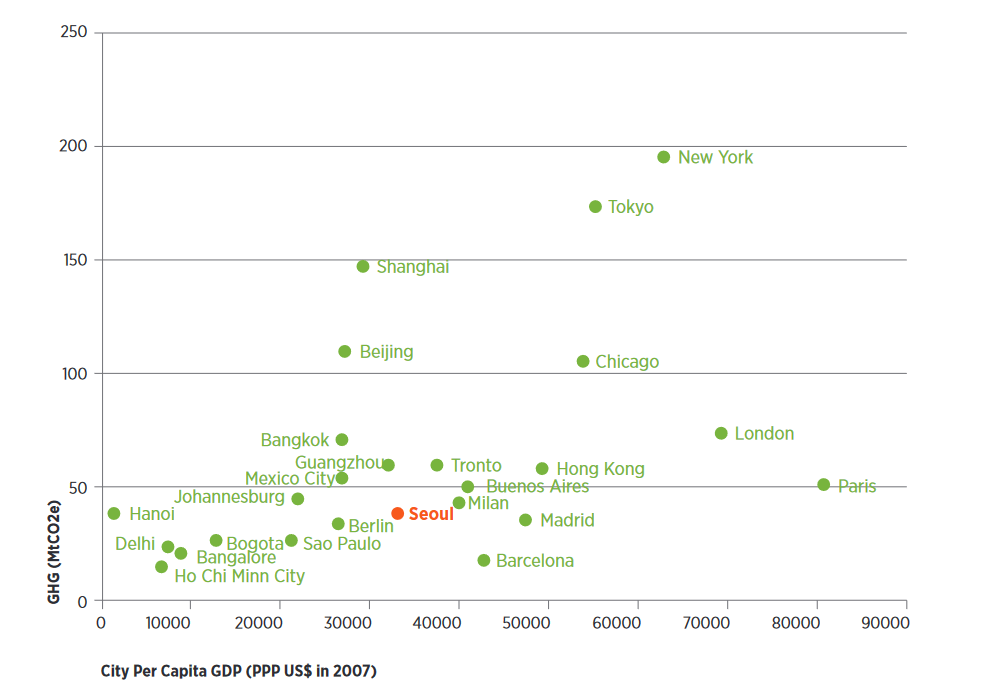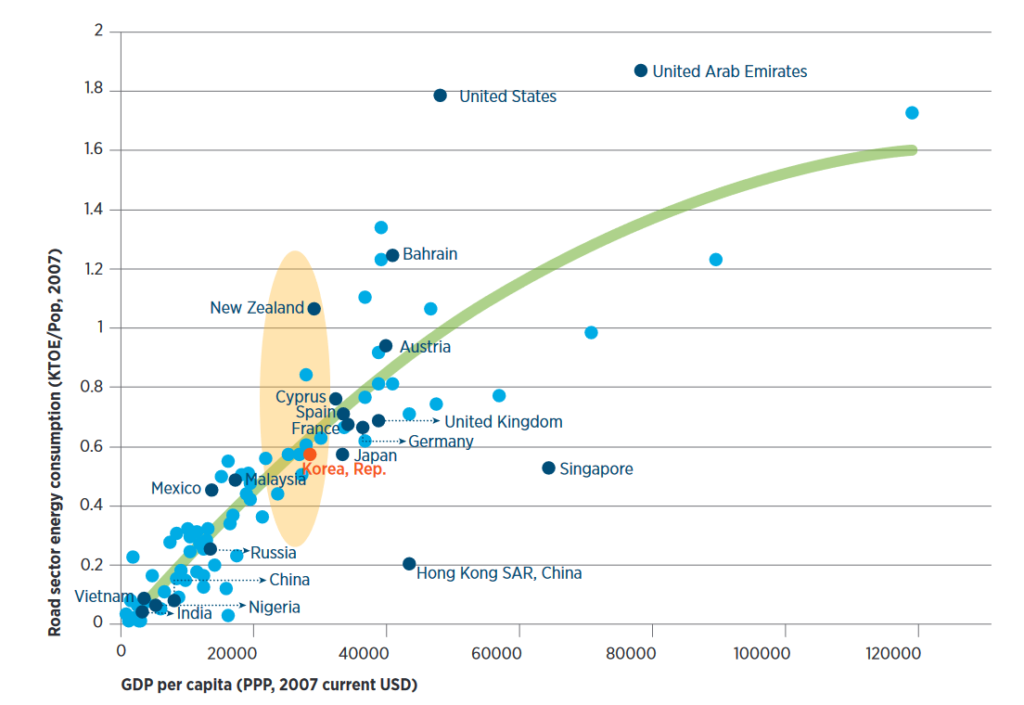Green Transportation in South Korea – a Key Enabler for the Net-Zero Revolution
12 June 2024 – by Viktor Tachev
Since the end of the Korean War in 1953, the Republic of Korea has evolved from a developing country into having the 10th-highest GDP globally. However, the nation’s economic success has been driven primarily by energy-intensive industries powered by fossils. While this has shaped the country’s image as a “climate villain,” today, the government is determined to change it. In the journey towards a sustainable future, South Korea has taken an ambitious step – to embrace green transportation as one of the critical enablers for its net-zero pathway.
South Korea’s Climate Hazard
The geographical specifics of South Korea make it prone to various natural hazards, including typhoons, floods, droughts, tsunamis, earthquakes, and more. Climate change further exacerbates their effects.
Between 1912 and 2008, the temperature on the Peninsula has gone up 1.7°C and rainfall has increased by 19%. Experts believe that going forward, South Korea will experience extreme weather events that will affect many major sectors of the economy.
Officials and the public acknowledge the problem. South Koreans rank climate change at the top of their list of potential national threats. Officials plan to mitigate natural disasters through various measures centred around better land-use planning, upgraded building standards, and enhanced protection of forests and wetlands.
However, they also realize that South Korea needs to think long-term and at a broader scale. As a result, the country has recognized green transportation as one of the core pillars of its decarbonization strategy.
Green Transportation in South Korea 2024
In 2024, South Korea is set to lead the way in green transportation with new initiatives aimed at reducing carbon emissions and improving air quality. The government’s commitment to electric vehicles (EVs) is evident, with an increasing number of charging stations being deployed across the country. It will also be good for the public transportation in South Korea.
Green Transportation in South Korea as Key to Addressing the Climate Impacts
The transportation sector is responsible for a third of global energy demand and a sixth of global greenhouse emissions. As one of the ten biggest polluters globally, South Korea’s determination to reshape its transportation sector is a crucial step in the battle against climate change.
Korea’s march towards sustainability started in 2008 with the announcement of the “Low Carbon & Green Growth” strategy for the future and a post-stimulus package. At the time, the measures were regarded as “particularly green.”The reason was that 69% of spending was intended for renewable energy and energy efficiency projects. However, the success of the program was not particularly convincing.
However, now, things are taking a different direction, thanks to the concept of green transportation. This idea is not new. The green transportation revolution was started in Seoul a few years back by the mayor, Park Won Soon. The city banned the most polluting diesel cars from entering the centre and adopted additional targets, including increasing the green transportation share to 80% by 2030 to tackle air pollution.

The success of green transportation measures on a local scale has shown that the country has the capacity and tools to effectively decarbonize its transportation network. Since 2008, South Korea has managed to maintain reasonable energy consumption levels of its road sector. Although it remains lower than in other countries with similar GDP and the CO2 emissions in the transport sector are under control, the government thought this is a perfect opportunity to press ahead with the transition to green transportation.

The Green Transportation Plans
The Blueprint to Climate Crisis by the Korean government clearly defines the steps it plans to take to reshape the transport sector.
First on the list of priorities is the accelerated commercialization of vehicles running on clean energy. Furthermore, the ratio of clean energy sources like electricity and hydrogen will increase among railways, marine and aircraft transportation.
The plans also include a campaign to encourage bus and truck operators to switch to cleaner vehicles. By 2030, the charging points across the country will grow from 5,000 to 15,000. By 2030, the country expects every third car sold in South Korea to be either electric or running on hydrogen. There are plans to invest 60 trillion won (USD 50.4 trillion) for future car technologies. A third of the investment will go to Hyundai Group.
The adopted green car subsidy program offers up to USD 17 million in subsidies to people buying electric cars and up to USD 33.5 million for hydrogen fuel-cell electric vehicles.
The Green Transportation Opportunities
South Korea is among the most important automotive manufacturers and the seventh-largest car exporter globally. Due to this, the government plans to scale up overseas sales of electric vehicles (EVs) by increasing the production capacity from 1.5% in 2018 to 10% by 2022. The country targets a mass roll-out of electric mobility. Furthermore, it aims to become a leading exporter of hydrogen and fuel cell vehicles by 2040.
Another target is the development of accompanying green industries, including the development of battery technologies. Currently, the export of lithium-ion batteries for EVs is among the leading exports of the country.
“The development of battery technology, which will become central to future means of mobility including electric vehicles, is a core driver that will transition Korea’s economy into a leading one.”
– President Moon Jae-in, Korea Times
President Moon announced South Korea’s ambitious plans to commercialize lithium-sulfur, solid-state, and lithium-metal batteries by 2025, 2027 and 2028, respectively. The country intends to invest at least 500 billion won (USD 425 million) in large-scale R&D projects. The goal – to become the number-one EV battery manufacturer in the world by 2030.
These are significant moves not only for the local but the global economy as well. Today, South Korea, alongside China and Japan, dominates the EV battery market, with the U.S. and the major economies in Europe heavily relying on Asian manufacturers.
In recent years, Korean companies have achieved notable progress. Today, they are competing for the top spots in the global EV battery market. LGES (second), Samsung SDI (fifth) and SK Innovation (sixth) are among the top six leading EV battery producers globally.
Challenges In Front of the Green Transportation in South Korea
Among the main challenges is the lack of clarity about the deadline to phase out diesel and petrol vehicles.
Furthermore, state subsidies for hydrogen fuel cell electric vehicles (FCEV) are 3 times higher than those for battery EVs. According to experts, South Korea’s hydrogen remains grey rather than green due to the usage of fossil fuels for its production. The inefficiencies of the hydrogen FCEV technology had already seen Volkswagen and Mercedes-Benz abandon it.
Besides, experts unite around the idea that even if EVs account for 50% alone, they will not be enough. Instead, they suggest strategic approaches, promoting a reduction in the demands for transport and a total rethink of people’s lifestyles.

by Viktor Tachev
Viktor has years of experience in financial markets and energy finance, working as a marketing consultant and content creator for leading institutions, NGOs, and tech startups. He is a regular contributor to knowledge hubs and magazines, tackling the latest trends in sustainability and green energy.
Read more







